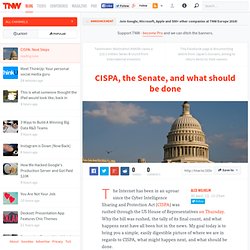

Stanford’s Jonathan Mayer On Fixing Privacy. Jonathan Mayer is the grad student whose research on internet tracking set off an explosive series of media reports and a flurry of privacy demands in Washington.

But what does Mayer himself think should be done — is it possible to regulate privacy without harming Silicon Valley? I spoke to him this week about the privacy problem and how to fix it. Here are some of his ideas: The Companies Can’t be Trusted to Regulate Themselves The tech and advertising industries have been aggressive in promoting their own version of do-not-track rules. Mayer says that the culture of technology companies, especially their focus on growth, makes them ill-suited to safeguard consumer privacy. The Real Life Social Network v2. Chen Guangcheng has a posse and Ai Weiwei is everywhere: Memes as dissent in China. Memes are “the street art of the social web,” says An Xiao Mina, a designer and artist in Los Angeles.

But in China, a country that represses speech and the press, the lulz can turn deadly serious. “Memes are a way of circumventing all the controls out there on the Chinese web,” she told me this weekend. “Not only do they remix fast, they’re very obscure.” Mina got the attention of the Chinese artist Ai Weiwei in 2011, when she helped create a community-powered Twitter feed that translates his tweets into English. Ai invited Mina to spend a year working with him. On the day she arrived, Jan. 12, Chinese authorities had demolished Ai’s Shanghai studio. “Obviously, it was a very scary time. She stumbled upon “Crack Sunflower Seeds,” an animated video that depicts boys and girls trying to tell the story of a sunflower-seed seller before a black hand sweeps them away.
Krulwich Wonders: Is The 'Right To Be Forgotten' The 'Biggest Threat to Free Speech On The Internet'? But if you live in Argentina, you can't look at her.

Put Yesica's name in Yahoo! Argentina and what do you get? You get nothing. A blank. She's not there. Yesica and her lawyers have exercised a legal right now dubbed "The Right to Be Forgotten" that allows you to remove embarrassing pictures or information you put on the web — and do it permanently, totally. Yesica demanded that Yahoo! Eric Schmidt, Google CEO, at Princeton. CISPA Lost six Cosponors in its Race to Pasage.
Well, if you needed more evidence that CISPA was rushed out the gate faster than a bovine in a hurry, try this on for size, via The Hill: Four Democratic and two Republican cosponsors of the Cyber Information Sharing and Protection Act (CISPA) reversed course and voted against the bill on the House floor on Thursday evening.

Sure, the bill had a plethora of cosponsors, but to jump ship before reaching port is always a rather startling action. It sends a rather mixed message: why would a Congressperson sponsor a bill, that even after amendments they found so odious that they backed out of it? Well, we have a bit of insight. CISPA: Next Steps. The Internet has been in an uproar since the Cyber Intelligence Sharing and Protection Act (CISPA) was rushed through the US House of Representatives on Thursday.

Why the bill was rushed, the tally of its final count, and what happens next have all been hot in the news. My goal today is to bring you a simple, easily digestible picture of where we are in regards to CISPA, what might happen next, and what should be done. Now, as always, this post is not political in the normal sense. We’re not advocating a party, or a politician, and certainly not an ideology. Instead, our subject is narrow: CISPA, and what it might mean for the technology world. So, if our prose runs a touch sharper, and our analysis a bit more overt and pointed than what you might normally find on TNW, that’s why.
And of course, if you don’t know much about CISPA, but want a bit of a primer, this is for you. The Passage Let’s step back a moment and catch our breath. The Philosopher Whose Fingerprints Are All Over the FTC's New Approach to Privacy - Alexis Madrigal. The brilliant New York University philosopher Helen Nissenbaum has put her approach to privacy at the center of the national agenda.

Nissenbaum's approach to privacy focuses on how information flows, not just the information itself. PALO ALTO -- A mile or two away from Facebook's headquarters in Silicon Valley, Helen Nissenbaum of New York University was standing in a basement on Stanford's campus explaining that the entire way that we've thought about privacy on the Internet is wrong. It was not a glorious setting. The lighting was bad. The room was half empty. Facebook "likes" aren't speech protected by the First Amendment, rules judge. This post references a case decided by the US District Court of Eastern Virginia, Bland v.

Roberts, 2012 Bland and his cohorts worked in the Hampton Sheriff’s Office, under B.J. Roberts. Roberts ran for re-election against Jim Adams, and the plaintiffs were lukewarm in their support of Roberts. In fact, three of the plaintiffs went so far as to "like" Adams' Facebook page.